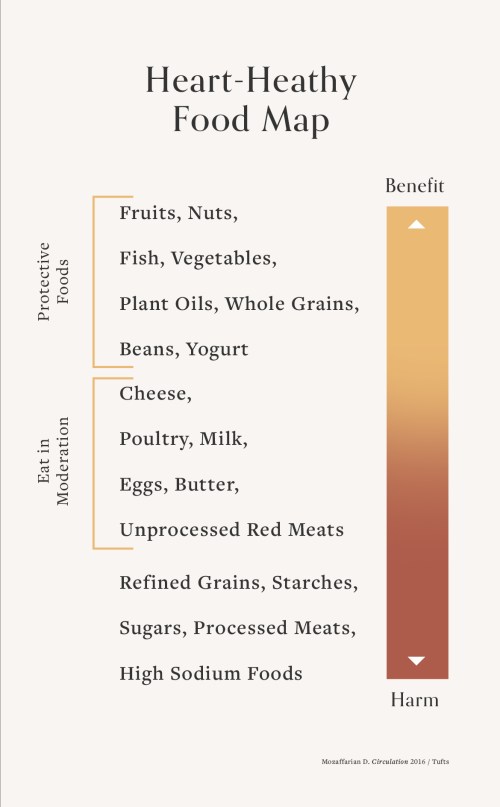While it’s certainly sobering that cardiovascular disease is the number one cause of death in this country, the good news is that this is a health condition that’s largely avoidable. According to the American Heart Association, heart disease is largely preventable if someone prioritizes regular exercise and a healthy diet. But “healthy diet” is so…vague. It certainly doesn’t help someone decide between having oatmeal or eggs for breakfast or whether it’s still cool to load your enchiladas up with extra cheese.
Experts in This Article
cardiologist, professor of medicine at Tufts School of Medicine, Jean Mayer Professor of Nutrition at the Friedman School of Nutrition Science and Policy at Tufts University
Demystifying a heart-healthy diet was the focus of a lecture by cardiologist Dariush Mozaffarian, MD, the dean of the Friedman School of Nutrition Science & Policy at Tufts University, at a recent health summit hosted by The Well. In his talk, Dr. Mozaffarian highlighted which foods were protective foods (aka linked to protecting against heart disease), foods to eat in moderation, and foods to minimize (because they are being detrimental for heart health). This simple framework helps make putting together a heart-healthy diet a bit easier. Keep reading for the full details.
Heart-healthy diet food map

Protective foods
Fruits, nuts, fish, veggies, plant oils (such as olive oil, avocado seed oil, and flaxseed oil), whole grains (such as quinoa, brown rice, barley, oats, millet, farro, sorghum), beans, and yogurt all form “protective” end of the food map; these are foods Dr. Mozaffarian says actively help prevent cardiovascular disease. “Many of these foods give rise to new life, planted in the ground under the harshest of conditions, they nurture a new plant life into being. The thousands of trace [polyphenols] and other nutrients in these foods, needed to nourish a new plant as it is born, are what our bodies need as we age,” Dr. Mozaffarian says, primarily referring to fruits, vegetables, and beans. Polyphenols benefit heart health because they increase protective HDL cholesterol (the good cholesterol) and help lower inflammation.
Watch the video below to learn more about the benefits of olive oil:
Dr. Mozaffarian adds that plant oils and fish both contain healthy fats, and yogurt contains active probiotics, which support gut health. To his point, nutrients in food aren’t just beneficial for one part of the body; what’s good for your heart is good for the body in other ways too, such as brain health and gut health. Healthy fats, for example, are also important for brain health. And one study showed that participants who ate more than two servings of yogurt per week were 20 percent less likely to experience heart disease or strokes, showing it’s a food that benefits the gut and the heart.
Foods to eat in moderation
Dairy, poultry, eggs, and unprocessed red meats all make up the middle of Dr. Mozzaffarian’s food map. In moderate amounts, these foods won’t negatively impact heart health, but if you eat too much of them, it could put unnecessary stress on your heart.
The reason why dairy is recommended in moderation is that it has more saturated fats than unsaturated fats—and saturated fats, in excess, aren’t good for heart health. The same goes for red meat, which has more saturated fat than fish or plant-based proteins, like beans. The verdict on eggs is a bit more complicated. Some studies show that eating an egg every day can actually help lower the risk of cardiovascular disease. But eating more than that may be too much of a good thing—which is why Dr. Mozaffarian recommends enjoying them in moderation.
Watch the video below to see what a registered dietitian of eggs:
Foods to minimize
Refined grains, starches, sugars, processed meats, and high-sodium foods all make up the “harmful” red section of the heart-healthy food map. “Refined carbs and starches are rapidly digested, leading to spikes in glucose, which harms the liver, increases insulin and triglycerides, and lead to central weight gain and diabetes,” he says. “These carbs are also fully digested in the stomach and small intestine, starving the gut microbiome in the large intestine, leading to further health problems.”
As for high-sodium foods—which Dr. Mozaffarian says often include packaged foods and processed meats—they are linked to raising blood pressure, which creates scarring in the blood vessels, heart, and kidneys. “Processed meats may also have other preservatives that could increase the risk of diabetes,” he adds, a condition that is associated with an increased risk of heart disease. A good rule of thumb is to keep your sodium intake under 2,300 milligrams a day.
It bears repeating that cardiovascular disease is largely preventable. What you eat now will impact you well into the future—and as this food map shows, there’s still plenty you can keep on your plate.
Oh hi! You look like someone who loves free workouts, discounts for cult-fave wellness brands, and exclusive Well+Good content. Sign up for Well+, our online community of wellness insiders, and unlock your rewards instantly.
Sign Up for Our Daily Newsletter
Get all the latest in wellness, trends, food, fitness, beauty, and more delivered right to your inbox.
Got it, you've been added to our email list.











